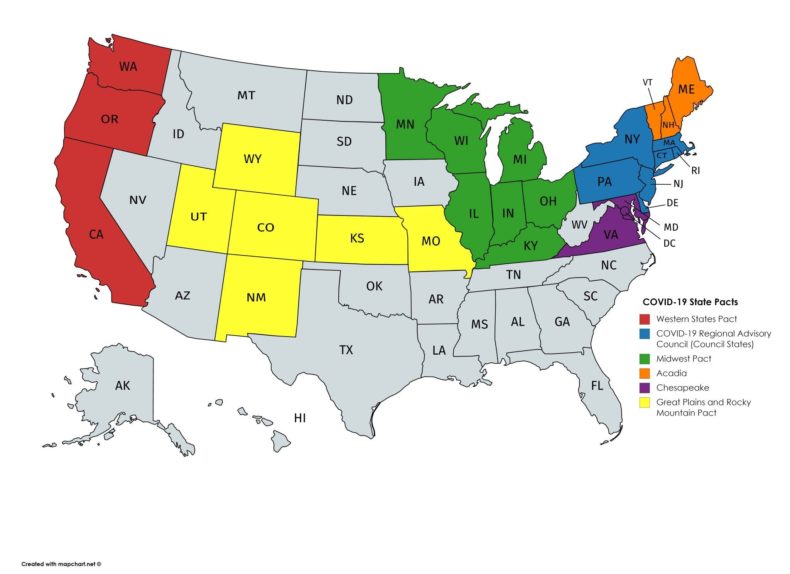
It’s a cliché in art to have a sudden burst of inspiration. I was just looking at the bird, and boom, the poem just…came to me! Or, I was scuba-diving off the coast of Fiji and I couldn’t believe it — the song just wrote itself! I think of that quote from Anne Lamott’s Bird by Bird about how no one actually writes good first drafts, except this one writer she knows, “but we do not like her very much. We do not think that she has a rich inner life or that God likes her or can even stand her.”
So forgive me when I say that for the very first time in my adult life, I was — jazz hands — struck by inspiration. I saw this map of the U.S. showing the regional coalitions states had formed to combat coronavirus, and I knew I needed to write some speculative fiction, set in a future world where these groups might have political significance.
Unfortunately (or fortunately?), I haven’t written fiction since my middle school X-Files fanfiction. But if I’m not going to throw myself into a weird pet project during Quarantimes, when will I? So, here it is. Imagine 15 years have passed and you’ve just clicked on a news story:
CASCADIAN FAMILY DETAINED IN U.S.; TENSIONS FLARE
May 1, 2035
SALT LAKE CITY — A family of four is being held in Utah after attempting to cross the Cascadia-U.S. border in West Wendover. Authorities allege that the family attempted to use forged documentation to enter the country.
Bobson Dugnutt, 43, his partner Lennay Kekua Dugnutt, 45, and their two children, 10 and 13, were traveling from the Cascadia capital of San Francisco to Denver, which requires crossing through the U.S. territory of Utah. As required by U.S. law, the family presented their digital immunity cards; however, U.S. border officials say the cards showed evidence of doctoring, and will detain the family until they can independently verify their recent activity through their cell phone data, social media activity, and surveillance footage.
Cascadia has officially requested the family’s release. “The nation of Cascadia calls on the United States to immediately release all wrongfully detained Americans being held in the U.S.,” said Arnold Schwarzenegger, Cascadia’s ambassador to the U.S., at a press conference earlier today.
The Dugnutts’ lawyers maintain that the family believed their digital immunity cards were legitimate, but that they had fallen prey to a scam immunity card clinic. While the immunity card system was introduced in the U.S. in 2021 amidst the coronavirus crisis, Cascadians abandoned the system after the two nations split in 2023. In the following years, the U.S. continued to develop the immunity card program, collecting citizens’ data not only to issue passports and right-to-work clearances but also to sell targeted advertising to companies. In 2026, Cascadia and the U.S. entered an agreement for citizens of Cascadians to travel to or through the U.S. by applying for cards through Cascadian immunity clinics administered by U.S. officials.
The Dugnutts’ plight highlights the rise of black market card dealers operating what appear to be official clinics. While some savvy consumers can identify these illegitimate card dealers by their below-market prices, scam immunity card dealers have successfully deceived over 30,000 Cascadians into purchasing sham immunity cards since 2030, according to the Cascadian Department of State. Typically, illegitimate card holders are turned away at the border; U.S. officials declined to comment on why the Dugnutts were detained.
International human rights watchdog organizations have expressed concern that the U.S.’s investigation into the family’s activities could take months. The U.S.’s surveillance architecture is among the world’s most comprehensive, as citizens’ movements and purchases are tracked through the country’s network of street cameras, digital doorbells, and compulsory cell phone data sharing.
This incident heightens tensions both between the U.S. and Cascadia, and among the U.S. states’ Regional Councils. In a statement, Andy Beshear, chair of the U.S.’s Midwest Regional Council, publicly condemned the U.S.’s actions against Cascadia. “On behalf of the Midwest, Eastern Seaboard, Acadia, and Chesapeake regional councils, I call on President Kushner to release the Dugnutts,” he said in a statement. Since the U.S. and Cascadia’s 2023 split, the regional groups have been increasingly vocal about their opposition to their country’s leadership; international relations scholars warn that the Regional Councils’ coalition may soon follow Cascadia in a declaration of independence.
However, experts say, the split would be significantly more acrimonious than Cascadia’s, given the Chesapeake Region’s primacy in U.S. politics and the Eastern Seaboard cities’ historical relevance to the country. With the loss of California agriculture and west coast technology assets, economists speculate that the U.S. will act decisively to keep control of the Regional Council states. “Cascadia struck while the iron was hot; the U.S. was in a bad way economically after the Coronavirus Recession, and Cascadia was able to convince them that the split was mutually beneficial,” says Glenallen Mixon, a professor of public policy at Cascadia’s Bezos University. “The Regional Councils coalition lacks that kind of leverage, but they’re clearly sending a message to U.S. leadership by siding with Cascadia.”
The Kushner administration has not yet commented on the Dugnutts’ case.
I see what you did there, Jane 😉
https://thedragonfriends.fandom.com/wiki/Fighting_Baseball
I was having trouble generating fake names and then I realized… a list already exists!
I was literally just talking about this with someone…I mean, not the Dugnutts, but what living in Cascadia will be like.
Sometimes, I’m glad I’m old.